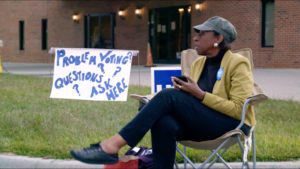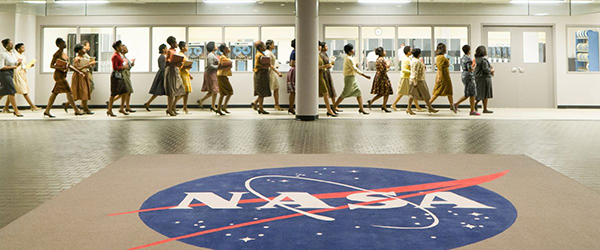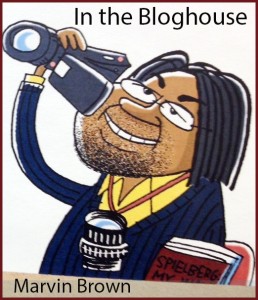A FUNDAMENTAL CHANGE BRINGS NEW DOCUMENTARY
2016 Election Inspires Director Anne de Mare to Deepen Film on Voting Protection
A project begun small and intimate for director Anne de Mare and reshaped by a troubling political climate into a full-fledged feature documentary, has become as timely as the latest headlines about red and blue states, election fraud and voter disenfranchisement.
Capturing the Flag, a Providence Productions featuring tireless voter protection volunteers, was originally intended as a short film, according to de Mare.
CHECK OUT MY REVIEW OF CAPTURING THE FLAG
“The story came to us through the lead character, Laverne Berry,” she says. Indeed Berry, a Brooklyn-based entertainment lawyer and volunteer protection worker, makes for an interesting subject.
Years ago at a polling site, Berry had an epiphany watching a janitor fashion a pushcart and chair into a transportation system for woman who struggled to walk to the polling booth. The experience drove Berry get more involved in volunteering. She also is a producer of the documentary.
“We set out to do a short film, but the tenor of the [2016] election brought things down to the fundamental issues of voting and democracy,” de Mare says. “It feels like something fundamental changed in our nation.”
And so the project was fundamentally changed, expanding to a full-length film, which follows three additional volunteers and encompasses a broader scope in detailing and investigating voter suppression.
“I think when we talk about voter suppression people think of the civil rights era and Jim Crow,” de Mare says. Shameful past efforts to deny a democratic voice to minorities was blatant. “Modern voter suppression is insidious. There are barriers combined with legislation that targets a specific group. People don’t really realize what’s happening.” They are sent to wrong polling places, intimidated because of past legal issues, deluded of their power through gerrymandering.
De Mare adds, “Making this film I learned that the battle that happens at the polls is vital.”
Despite its scope, the film maintains a level of intimacy through its on-the-ground, person-to-person perspective. If we’re given insight into voter suppression methods and historical context of disenfranchisement, the film is mostly concerned with how workaday folks, the power of regular people, make a difference.

Volunteer voter protection worker, Brooklyn-based entertainment lawyer and producer of Capturing the Flag, Laverne Berry. Photo credit: Nelson Walker III
“They care!” de Mare says. “Volunteers lobby for people to vote—to protect everyone’s rights. People have to be involved to decide elections.”
The controversial subject matter of voter suppression might seem an odd choice for a New York-based artist whose previous career involved theatrical works. “People don’t go to the theater anymore,” de Mare says. “They go to see films.” Her debut film, The Homestretch(2014), documented three homeless Chicago teenagers fighting to stay in school. The film, co-directed with Kirsten Kelly, garnered acclaim, including an Emmy.
After watching minority voters not being able to cast ballots and reliving the 2016 election, de Mare was asked how we inspire those who may be ground down by apathy?
“That’s the million-dollar question,” de Mare replies. She cites organizations like Democracy North Carolina that works to register voters as well as get them to the polls. The organization also pushes for legislation.
“I think it’s a model for what we need to look at.”
Looking ahead, de Mare has plans to rework her documentary for educational purposes.
“We’re hoping to create an hour-long ‘cut-down’ for educational use so that the film can be used by people involved in this kind of work.”
Also down the road is a historical film documenting women who worked in munitions factories during World War II, and a co-directing effort (with Kirsten Kelly) that looks at an interesting intersection of domestic violence and law enforcement.
Capturing the Flag has its world premiere at the Full Frame Documentary Film Festival 2018.
| Marvin Brown’s Movie Review Archive



 Directed by Theodore Melfi, the film also inspires and entertains with its unabashed appreciation of science and intelligence, and with the heady competition between the U.S. and the Russians to reach the stars—the space race. I was surprised again when it took another lap around the screenplay to explore the gender inequality of the era.
Directed by Theodore Melfi, the film also inspires and entertains with its unabashed appreciation of science and intelligence, and with the heady competition between the U.S. and the Russians to reach the stars—the space race. I was surprised again when it took another lap around the screenplay to explore the gender inequality of the era.




